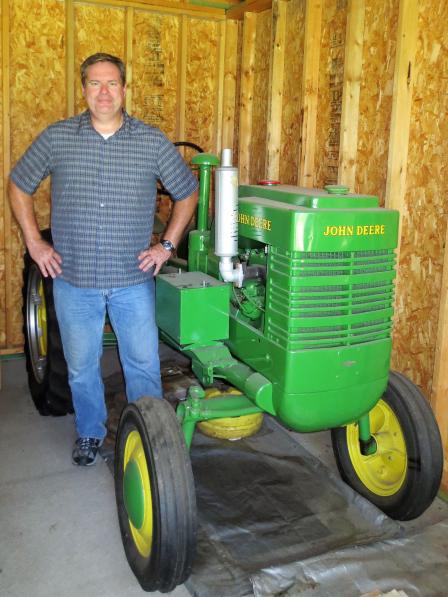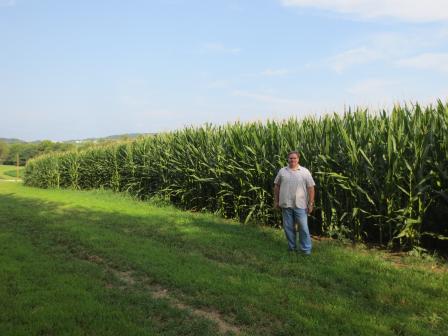 Robert Weber standing in front of an antique tractor on his family farmRobert Weber is a physical scientist working in ORD’s Center for Environmental Solutions & Emergency Response (CESER)/Technical Support Coordination Division (TSCD) as a Superfund and Technology Liaison stationed in EPA Region 7 which includes the states of Iowa, Kansas, Missouri, Nebraska, and 9 Tribal Nations. He uses his expertise and experience both as a geologist and former project manager to bring solutions to hazardous waste program project managers facing complex environmental characterization and remediation challenges.
Robert Weber standing in front of an antique tractor on his family farmRobert Weber is a physical scientist working in ORD’s Center for Environmental Solutions & Emergency Response (CESER)/Technical Support Coordination Division (TSCD) as a Superfund and Technology Liaison stationed in EPA Region 7 which includes the states of Iowa, Kansas, Missouri, Nebraska, and 9 Tribal Nations. He uses his expertise and experience both as a geologist and former project manager to bring solutions to hazardous waste program project managers facing complex environmental characterization and remediation challenges.
When did you first know you wanted to be a scientist?
My interest in natural science began when I was in elementary school observing fossils in the gravel driveway of my parent’s house near the family farm. I still haven’t forgotten the fossils found in some of those materials and have those very items still in my collection. Growing up on a farm helped foster a better understanding of the natural world.
How does your science matter?
As an ORD Superfund and Technology Liaison stationed in Region 7, I serve as a resource between my region and the EPA research centers and associated laboratories across the United States to enable the use of the best available science and engineering to solve environmental challenges.
I provide and coordinate technical support on complex and technically challenging contaminated sites working with Region 7 hazardous waste program project managers, including those in Superfund and Resource Conservation and Recovery Act Corrective Action. The work I perform, in cooperation with the ORD technical support centers, helps EPA achieve its mission of protecting human health and the environment through informed decision-making.
Tell us about your background.
I have a Bachelor of Science in Geology from the University of Kansas and a Master of Science in Geology from Kansas State University. When I first entered EPA, I was a Superfund Remedial Project Manager in Region 7 working on complex National Priorities List Superfund sites with removal, remedial, and enforcement components. For 13 years prior to EPA, I was a project geologist with an environmental consulting and engineering company and an environmental geologist and unit manager with a state environmental agency.
Describe the coolest day you’ve ever had at work.
I’ve had a lot of cool days at EPA. This is one of the best places to work! Probably one of the coolest days was actually at night. I serve in EPA’s Response Support Corps and was part of a response team tasked with observing shoreline cleanup activities in Mississippi for the Deepwater Horizon Response. I worked the night shift for about three weeks. One evening a member of the public thanked me for the work I was doing on behalf of EPA to help protect their beaches and natural areas. A simple gesture like that had a profound impact on me. In my opinion, too often the focus is on the negative in environmental work. Protecting human health and the environment is a noble cause and I am happy to play a small part in that.
 Robert standing in front a corn field on the family farmWhat steps do you take in your daily life to protect the environment?
Robert standing in front a corn field on the family farmWhat steps do you take in your daily life to protect the environment?
My wife and I try to follow the reduce, reuse, recycle paradigm. We did not build a new house, but purchased an existing one and much of our furnishings are antique or repurposed. We try to buy local and/or organic where possible, we look for minimally packaged goods or those that can be recycled, and we compost. Public transportation is not that robust in our area, but we carpool and drive fuel efficient vehicles. We think about the consequences of our actions and purchases. Growing up in the country and on a farm instilled the values of self-reliance and using your resources efficiently with minimal waste.
If you could have dinner with any scientist, past or present, who would it be? What would you ask him or her?
I would choose two - Charles Lyell and Charles Darwin. Both were friends and supporters of each other during times when their individual science discoveries were being challenged. Charles Lyell published the popular “Principals of Geology” which led to the current way that we think about the earth’s history and Darwin’s “On The Origin of Species” toppled the thinking of the time by adding evolution to the discussion. Both were not afraid to challenge the status quo. I would ask each what inspired them to reach beyond their current understanding of the world in order to make such striking discoveries.
If I could host a dinner party, I would also invite Albert Einstein, Carl Sagan, and Neil deGrasse Tyson. A discussion of astrophysics and astronomy would be on the menu.
If you weren’t a scientist, what would you be doing?
If I weren’t a scientist, I would probably have a career in historic preservation. I have always been a student of history because I find history and its lessons fascinating. Preserving those lessons to teach future generations may help to minimize repeating the mistakes of the past. I would also spend more time on the farm and start up an antique tractor restoration business since I will eventually need to make my hobby pay for itself. I love to travel and continuing to explore and learn new things will always be at the top of my list.
Any advice for students considering a career in science?
It is a marathon, not a sprint. Keep yourself open to new opportunities as you progress through your academic and work career. For younger folks reading this article, find a mentor and test your skills and interest by participating in science fair projects. One of my more memorable science fair projects was a study in energy efficiency during middle school. During your college/university education, seek internships. The opportunity for an internship with the U.S. Geological Survey during my undergraduate education was an important start for my environmental career and I still appreciate the foundation that it helped build.
What do you think the coolest scientific discovery was and why?
There are a number of cool scientific discoveries. These include the Copernicum System, the Big Bang Theory, the Law of Universal Gravitation, the Theory of Relativity, and the Theory of Evolution. These discoveries together help us to understand that we as humans are not the center of the universe (or universes) and hopefully help us to think about the longer-term, larger picture. Each one of these discoveries has a certain elegance and beauty that inspires today’s scientists to learn more about our place in the world.
Is there a project or effort that you are most proud of at the EPA?
There are many projects and efforts that resonate. One past exemple that comes to mind is working with EPA’s Office of Research and Development (ORD) and Region 7 to offer an ORD Tools Café in December 2015. States, tribes and communities were invited to interact with ORD scientists to learn more about the great work that ORD does. I liked seeing the relationships being built and knowledge transferred with both the region and stakeholders. In this time of virtual meetings, there really is no substitute for in-person interactions.
Recently in 2020, I had the opportunity to serve as the Acting Director of CESER/TSCD during the COVID-19 pandemic. Leading a team of talented and dedicated EPA professionals in a virtual work environment was energizing and extremely rewarding. I observed first-hand the excellent and impactful work of my division and all of the other divisions and staff supporting CESER’s mission. From this perspective, I gained an appreciation of the complexity, volume and quality of work that not only CESER is responsible for, but also in other parts of the agency. With the knowledge from this experience, I know that we are in good hands when it comes to protecting human health and the environment.
Editor's Note: The opinions expressed herein are those of the researcher alone. EPA does not endorse the opinions or positions expressed.
 Robert Weber standing in front of an antique tractor on his family farmRobert Weber is a physical scientist working in ORD’s Center for Environmental Solutions & Emergency Response (CESER)/Technical Support Coordination Division (TSCD) as a Superfund and Technology Liaison stationed in EPA Region 7 which includes the states of Iowa, Kansas, Missouri, Nebraska, and 9 Tribal Nations. He uses his expertise and experience both as a geologist and former project manager to bring solutions to hazardous waste program project managers facing complex environmental characterization and remediation challenges.
Robert Weber standing in front of an antique tractor on his family farmRobert Weber is a physical scientist working in ORD’s Center for Environmental Solutions & Emergency Response (CESER)/Technical Support Coordination Division (TSCD) as a Superfund and Technology Liaison stationed in EPA Region 7 which includes the states of Iowa, Kansas, Missouri, Nebraska, and 9 Tribal Nations. He uses his expertise and experience both as a geologist and former project manager to bring solutions to hazardous waste program project managers facing complex environmental characterization and remediation challenges. Robert standing in front a corn field on the family farmWhat steps do you take in your daily life to protect the environment?
Robert standing in front a corn field on the family farmWhat steps do you take in your daily life to protect the environment?